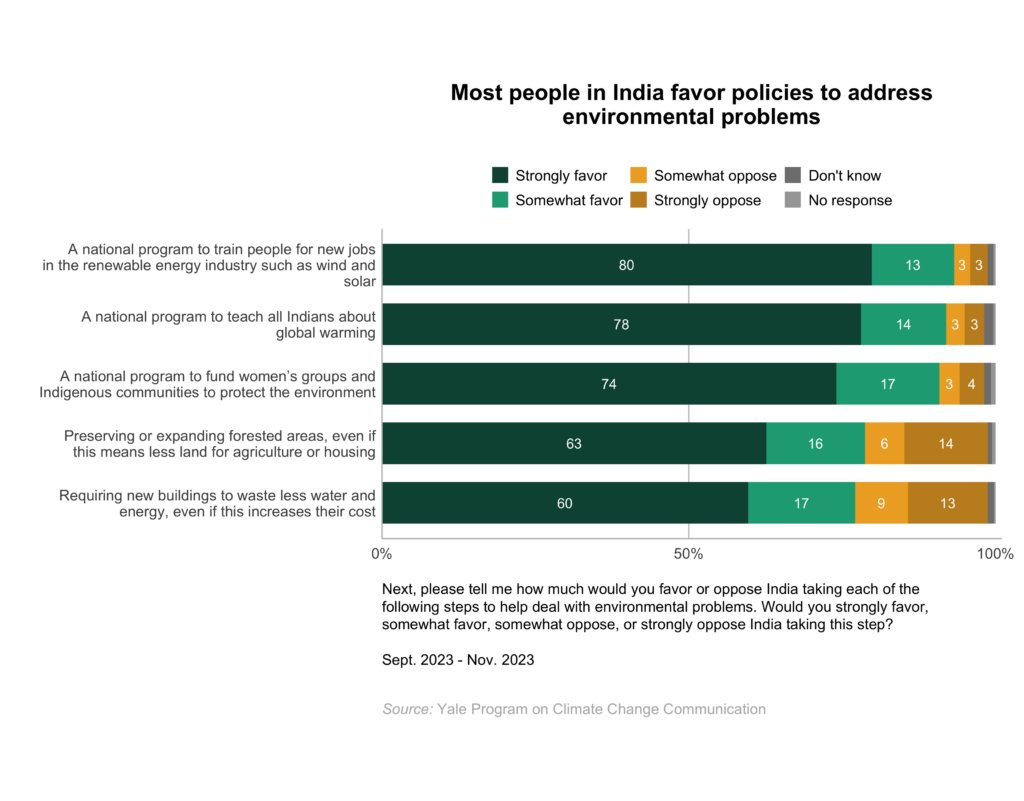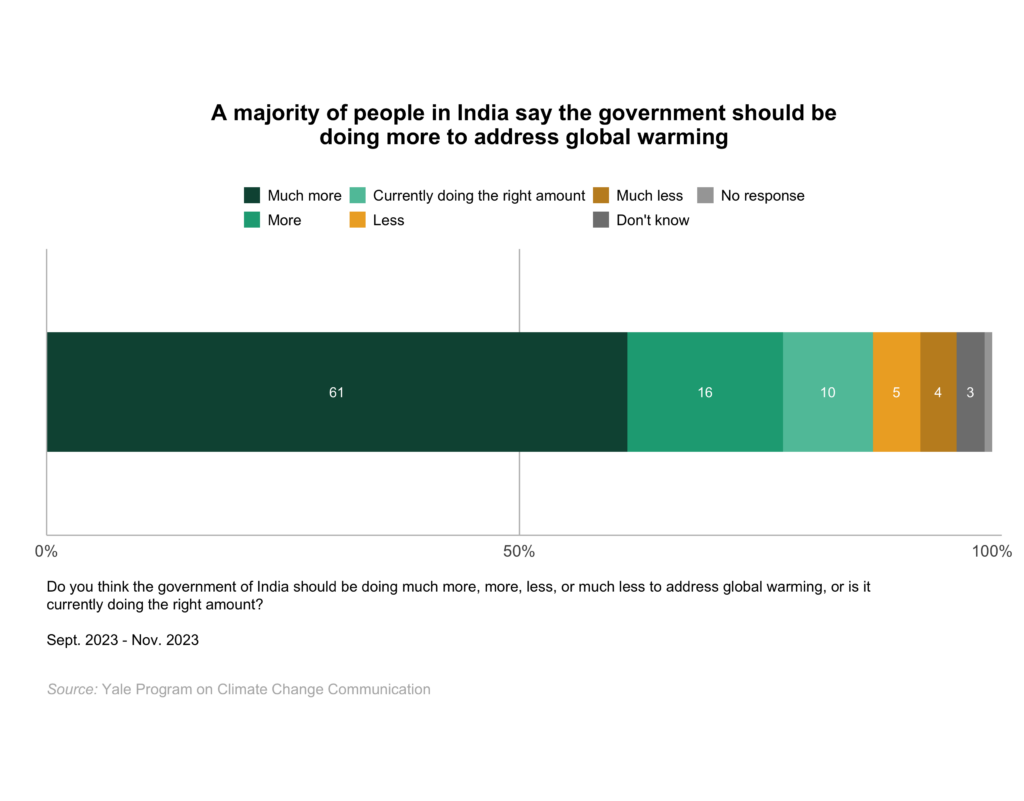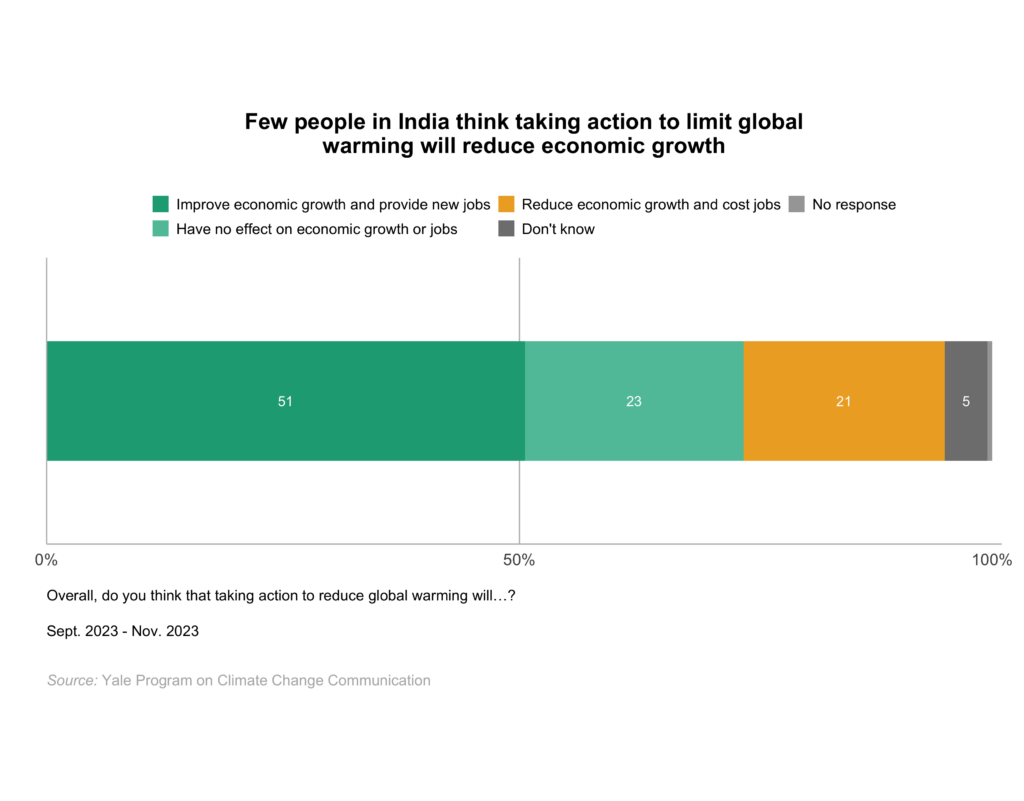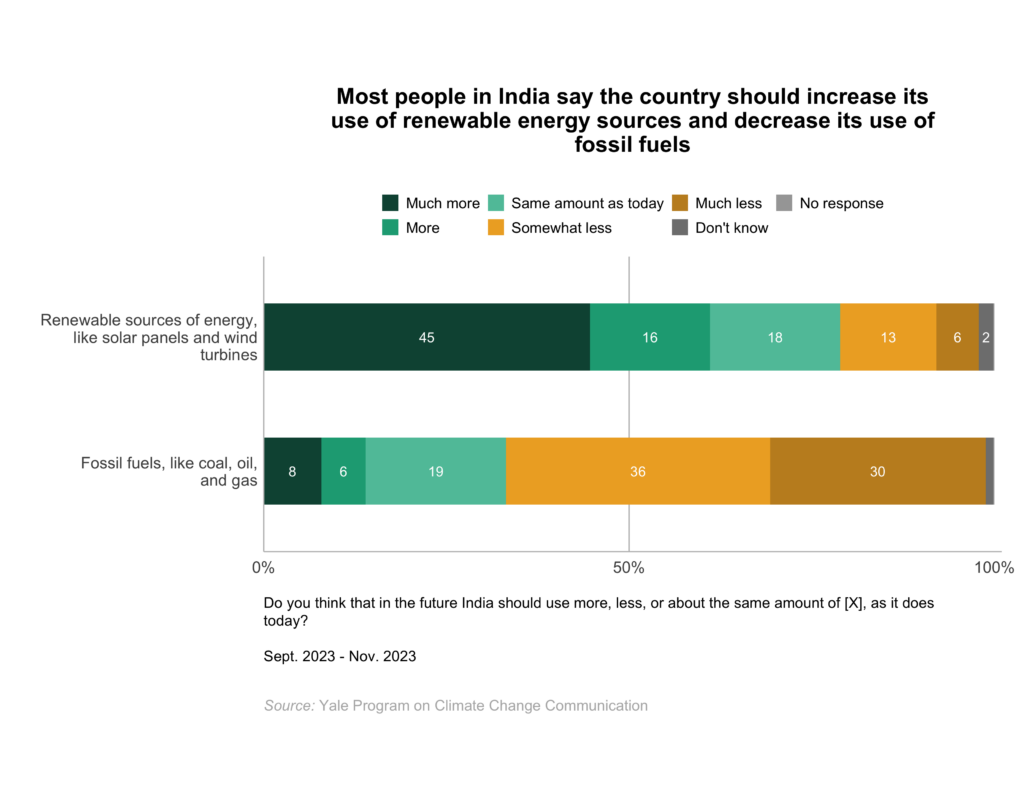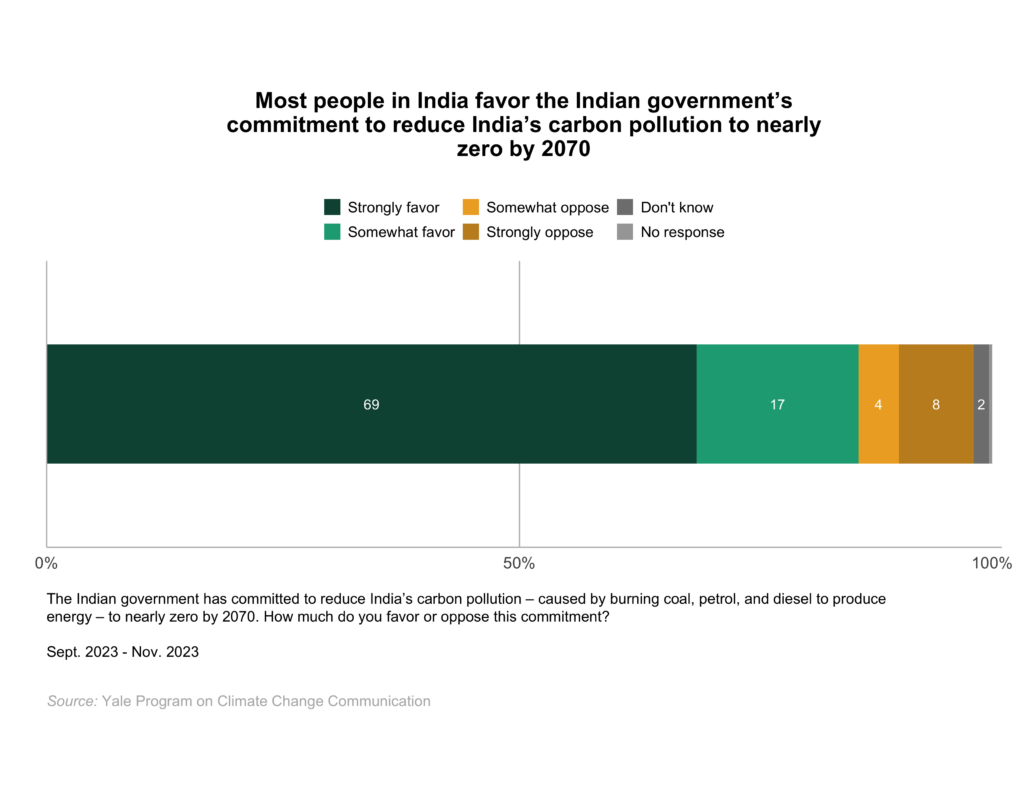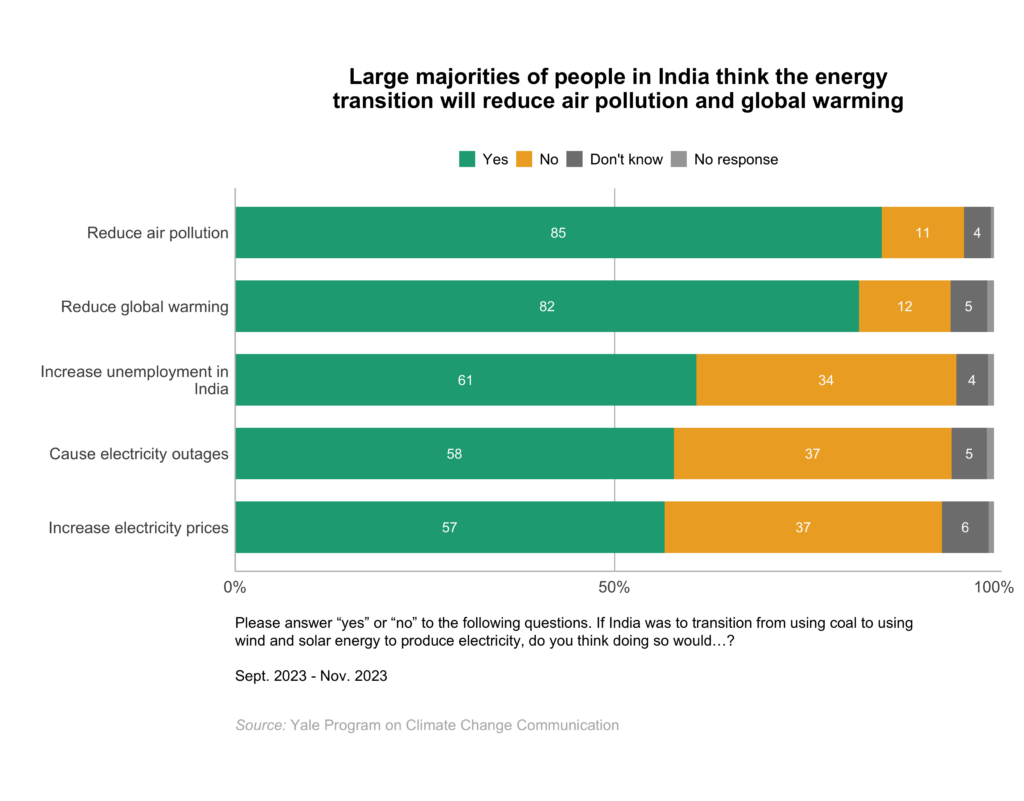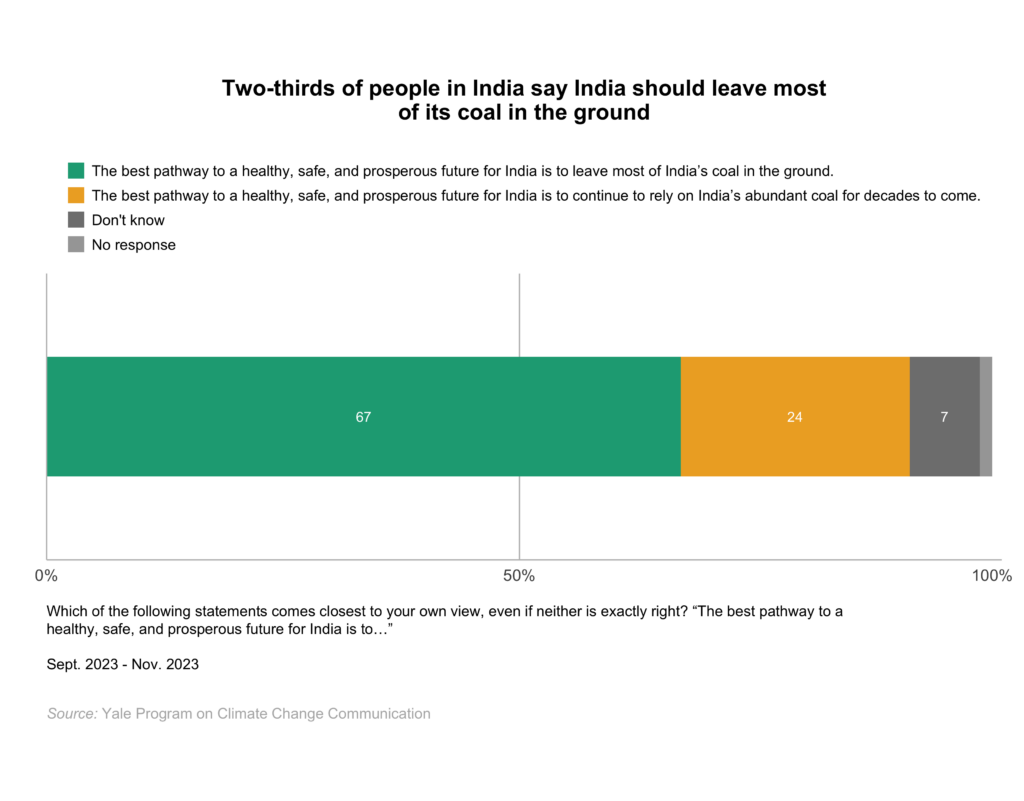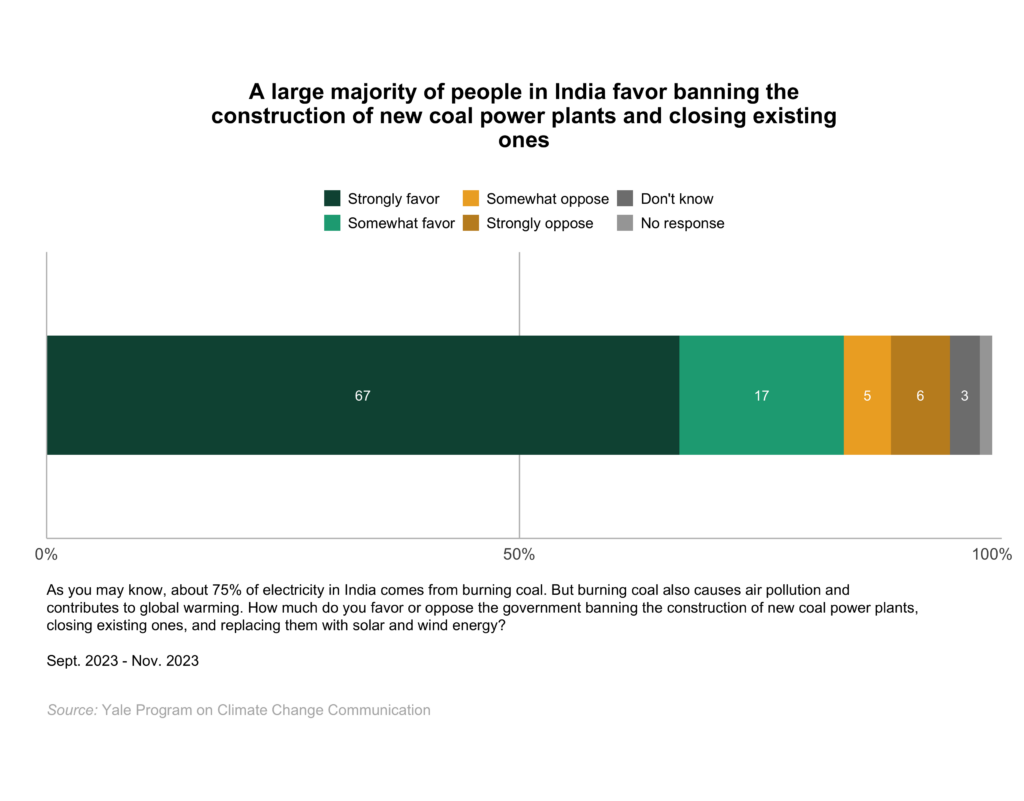Report · May 16, 2024
Climate Change in the Indian Mind, 2023
By Anthony Leiserowitz, Jagadish Thaker, Marija Verner, Emily Goddard, Jennifer Carman, Seth Rosenthal, Naga Raghuveer Modala, Mallika Talwar, Yashwant Deshmukh, Gaura Shukla, Jennifer Marlon, Matthew Ballew and Matthew Goldberg
Filed under: Behaviors & Actions and Beliefs & Attitudes
4. Support for Climate and Energy Policies
4.1 Most people in India favor policies to address environmental problems.
Large majorities of people in India either “strongly” or “somewhat” favor policies to address environmental problems in India, including:
- A national program to train people for new jobs in the renewable energy industry such as wind and solar (93%, +11 percentage points since 2021–2022).
- A national program to teach all Indians about global warming (92%, +9 percentage points since 2021–2022 and +22 percentage points since 2011).
- A national program to fund women’s groups and Indigenous communities to protect the environment (91%; not asked previously).
- Preserving or expanding forested areas, even if this means less land for agriculture or housing (79%, +9 percentage points since 2021–2022).
- Requiring new buildings to waste less water and energy, even if this increases their cost (77% +8 percentage points since 2021–2022).
4.2 A majority of people in India say the government should be doing more to address global warming.
Seventy-eight percent of people in India say the government of India should be doing either “much more” (61%) or “more” (16%) to address global warming. By contrast, only 10% say the government is currently doing the right amount to address global warming, and 9% say the government should be doing either “less” (5%) or “much less” (4%) to address the issue.
The percentage of people in India who say the government of India should be doing “much more” to address global warming is 15 percentage points higher than in 2021–2022.
4.3 Few people in India think taking action to limit global warming will reduce economic growth.
More than twice as many people in India think taking action to reduce global warming will improve economic growth and provide new jobs (51%) than think it will reduce economic growth and cost jobs (21%). About one in four (23%) think taking action on global warming will have no effect on economic growth or jobs.
4.4 Most people in India say the country should increase its use of renewable energy sources and decrease its use of fossil fuels.
A majority of people in India (61%) say that in the future, India should use either “much more” (45%) or “more” (16%) renewable sources of energy, like solar panels and wind turbines, than it does today. Fewer (19%) say India should use either “much less” (6%) or “somewhat less” (13%) renewable energy, and 18% say India should use the same amount of renewable energy as it does today.
Most Indians (66%) also say India should use “much less” (30%) or “somewhat less” (36%) fossil fuels, like coal, oil, and gas, than it does today. Few (14%) say India should use “much more” (8%) or “more” (6%) fossil fuels, and 19% say India should use the same amount of fossil fuels as it does today.
4.5 Most people in India favor the Indian government’s commitment to reduce India’s carbon pollution to nearly zero by 2070.
At the 26th United Nations Framework Convention on Climate Change (COP 26) in November 2021, the Indian government announced its intention to reach net zero (or nearly zero) carbon pollution by 2070. A large majority of people in India (86%) say they either “strongly favor” (69%) or “somewhat favor” (17%) this commitment. In contrast, only 12% of Indians either “strongly oppose” (8%) or “somewhat oppose” (4%) this commitment.
4.6 Large majorities of people in India think the energy transition will reduce air pollution and global warming.
People in India were asked about potential impacts if India were to transition from using coal to using wind and solar energy to produce electricity. Large majorities say doing so would reduce air pollution (85%) and reduce global warming (82%).
Many people in India, however, also think that transitioning from coal to wind and solar would increase unemployment in India (61%), cause electricity outages (58%), and increase electricity prices (57%).
4.7 Two-thirds of people in India say India should leave most of its coal in the ground.
Asked about the best pathway to a healthy, safe, and prosperous future for India, about two in three (67%) people in India say it would be best to leave most of India’s coal in the ground. By comparison, only one in four people in India (24%) say it would be best to rely on India’s abundant coal for decades to come, while about one in ten (7%) say they don’t know.
4.8 A large majority of people in India favor banning the construction of new coal power plants and closing existing ones.
Respondents were presented with the following statement: “As you may know, about 75% of electricity in India comes from burning coal. But burning coal also causes air pollution and contributes to global warming.” Then, they were asked how much they favor or oppose the government banning the construction of new coal power plants, closing existing ones, and replacing them with solar and wind energy.
A large majority of people in India (84%) say they “strongly favor” (67%) or “somewhat favor” (17%) banning the construction of new coal power plants, closing existing ones, and replacing them with solar and wind energy. By comparison, only about one in ten (11%) say they “strongly oppose” (6%) or “somewhat oppose” (5%) doing so, while 3% say they don’t know.
